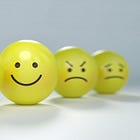I won’t leave you simmering in suspense. Here’s the graph, from a study published a few weeks ago.
Okay, I cheated. I left out the y-axis.
We’ll get to that quickly. Whatever we’re looking at here, it dips in adolescence and only bumps back up a little bit in old age.
I’m pretty sure some of you have figured it out already. This graph shows a questionnaire-based score for ‘life satisfaction’ for over 140,000 people in Germany and the UK.
Another study, which happened to be published on the same day as the first one, adds another possible reason: teens are mean to each other. Unless… you’re athletic and/or attractive. Put differently, the authors identify:
… direct and indirect pathways from stigmatized traits (i.e., low athleticism, low attractiveness) to adjustment difficulties (i.e., alcohol misuse, loneliness)
Adolescence was the focus of these studies, but what stands out for me is that this dip does not reverse until almost four decades later. This is not new. A study from a few years ago looked at 1.3 million people in 51 countries and consistently found this U-shape of life satisfaction.
That’s not what we’re promised when growing up. “High school sucks sometimes,” well-meaning adults told us, “but it’ll get better when you find your feet.”
It seems we don’t find our feet until we’re in our 60s.
Since the topic of the first two studies was the adolescent drop in life satisfaction, the scientists did not pursue the question ‘Why is adulthood such a bleak hellhole that spans over half our lives?’ Even the large > 1 million people survey comes to the sober conclusion:
The scientific explanation for the approximate U-shape currently remains unknown.
(Important caveat: this is large-scale population data. Your personal trajectory might be different. I hope it is.)
In short, if we look at the average, at the most common trajectories in life, adulthood correlates with substantially less life satisfaction than childhood or old age. What’s going on?
Let’s take a guess.
I could lean into my bias here and suggest that it’s all about having to have a job. (Let’s say that I have some reservations about the modern office work culture…) I could even point to universal basic income trials that unanimously report higher subjective well-being. In some UBI trials, life satisfaction scores jump enough to entirely erase the adult valley of grimness. (The trials also show consistent improvements in various aspects of cognitive functioning. It might even improve (!) employment. Hello, politicians?)
Leaving it at that would be unfair of me. There has to be more at play.
Here, we leave solid footing and step onto shaky grounds of speculations.
The job/income issue is only one aspect of something larger. It is a truism that adolescence is the stage of life during which we are first confronted with the ‘big questions’. Who am I? Where do I fit? Who should I be? As we embark on the quest for answers, we realize not everyone thinks we’re as fantastic as our parents told us (assuming you grew up in a warm family), and we learn that we can’t all be astronauts or superstars. No wonder that most affective disorders (depression, anxiety, etc.) initially pop up during late adolescence/early adulthood.
And then, while we’re still reeling from the insight that maybe we’re not that special, adult life wanders over to kick us when we’re down. Bully. Suddenly, we find ourselves drowning in responsibilities. Rent or mortgage, student loans, caregiving... While we try to juggle all this and more, we’re YOLO’d and FOMO’d by tremendous social pressures to fit into a box that we never truly chose. White picket-fenced house, diamond-studded wedding ring, 1.94 kids, 1.8 cats, and 1.6 dogs. But also luxurious trips and other fancy things to share on social media. Obviously. Everybody else is doing it, so we can’t stay behind. (Look mom, sarcasm.)
Congratulations, you are now another number, another cog, another fake smile to hide broken dreams.
Too much?
Irish comedian Dylan Moran once boiled life down to four stages:
There are four ages of human being: child, failure, old, and dead.
The valley of (un)happiness suggests we spend way too much time of our life stuck in the second stage.
Then, as we reach old age, the responsibility burden generally lightens. Kids are all grown up and take care of themselves, work is no longer an obligation, and so on. Suddenly, we have some time again. But, there’s a thing we don’t see in the (media coverage of the) U-shaped curve unless we zoom in: in very old age, close to death, life satisfaction drops again, in what’s called a ‘terminal decline’.
And so, the journey of life concludes in a graveyard of broken dreams and time spent unwisely.
In a short, mostly unrelated book, The Psychology of Money, fund manager and author Morgan Housel observes that:
… doing something you love on a schedule you can’t control can feel the same as doing something you hate.
Sounds like adulthood, doesn’t it? For most of us, our peak years mean spending more time and effort on tasks we didn’t choose following a schedule we didn’t set. There are exceptions, of course, but I’m willing to bet that this is how most people feel. We’ve known for at least a quarter century that perceived control is a key determinant of life satisfaction (and it can even erase the negative health effects of low income).
Well, that’s depressing.
Yet, if we fight back the gloom for a moment (feels weird coming from me, I know), another insight is waiting to be found, small and scared; a mouse whimpering in the footsteps of a snarling black dog.
Most of us know happiness as kids. We carry that capacity inside us, even if it is buried under the burden of adulthood. What’s more, the temporary uptick in life satisfaction later in life suggests that we can rekindle that happiness ability. Adulthood need not be a script. Yes, there are things we can’t escape. But somehow, somewhere in the cracks, we can - I hope - still carve out time to breathe, have fun, and smell the roses.
Be the outlier.
Hold on to child-like wonder and soar over that valley, you beautiful people.
Related thoughts:









One of the biggest things (maybe the biggest) I'm looking for in a life partner is that capacity for childlike wonder and awe. I thought I had her ... and I'll never forget those wide open eyes when she came around the corner in that canyon ... or the giggles when she found me in a bush trying to locate that one cricket making such beautiful music. That's one thing I will never want to live without.
Holding on to child-like wonder is one of the essential life skills, I think. I see so many young adults or older adults who have completely lost this, and look down upon the ones who still hold on to the wonder.